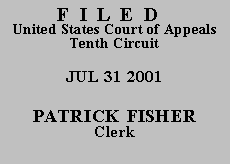

| GEORGE THOMAS PRATT,
Petitioner-Appellant, |
|
| v. | |
| L.E. FLEMING, Warden,
Respondent-Appellee. |
|
Petitioner George Thomas Pratt, a federal prisoner appearing pro se, appeals the district court's dismissal of his 28 U.S.C. § 2241 petition challenging his conviction and sentence. We have jurisdiction under 28 U.S.C. § 1291 and affirm.
Pratt entered a plea of guilty to conspiracy to manufacture methamphetamine and was sentenced to 210 months of imprisonment. His direct appeal was affirmed. United States v. Pratt, No. 91-7041, 1992 WL 83489 (10th Cir. Apr. 23, 1992). His two 28 U.S.C. § 2255 motions were denied and he did not appeal from those denials.
In his § 2241 petition, Pratt argued his sentence was based on findings set forth in the presentence investigation report rather than in the indictment, and that "[a]ll sentencing determination[s] [were] by preponderance of the evidence." Amended Petition at 6. The Government filed a motion to dismiss for lack of jurisdiction, arguing Pratt's claim was a challenge to the validity of his sentence that should be filed as a § 2255 in the district where he was convicted. In its report and recommendation, the magistrate court recommended that the motion to dismiss be granted, determining Pratt's claims attacked the validity of his judgment and sentence rather than execution of his sentence and must be brought under § 2255. The district court adopted the report and recommendation and granted the motion to dismiss.
"A petition under 28 U.S.C. § 2241 attacks the execution of a sentence rather than its validity and must be filed in the district where the prisoner is confined." Bradshaw v. Story, 86 F.3d 164, 166 (10th Cir. 1996). A petition under 28 U.S.C. § 2255 attacks the legality of detention and must be filed in the district that imposed the sentence. Id. A petition under § 2241 "is not an additional, alternative, or supplemental remedy to 28 U.S.C. § 2255." Id.
Pratt contended the § 2255 remedy was inadequate and ineffective because he could not have presented his claim based on Apprendi v. New Jersey, 530 U.S. 466 (2000) in his earlier § 2255 motions and he is now precluded from filing a successive § 2255 motion. "Failure to obtain relief under 2255 does not establish that the remedy so provided is either inadequate or ineffective." Bradshaw, 86 F.3d at 166. The magistrate found that Pratt had not alleged he had been denied certification of a successive § 2255 motion. Further, even if Pratt's Apprendi claim were properly brought under § 2255, he could not satisfy the AEDPA criteria. A new rule of constitutional law is "made retroactive to cases on collateral review" only when the Supreme Court holds it to be retroactively applicable. Tyler v. Cain, 121 S. Ct. 2478, 2482 (2001). Although the decision in Apprendi enunciated a new rule of constitutional law, the Supreme Court has not specifically held the rule to be retroactive to cases on collateral review. See Browning v. United States, 241 F.3d 1261, 1266 (10th Cir. 2001) (en banc). Consequently, an Apprendi challenge may not be raised at this time in a successive § 2255 motion. Id. at 1266-67.
We have reviewed Pratt's appellate brief and the entire record and agree with the thorough and well-reasoned analysis set forth in the magistrate's report and recommendation, which was adopted by the district court.
AFFIRMED. The mandate shall issue forthwith.
Entered for the Court
Mary Beck Briscoe
Circuit Judge
*.This order and judgment is not binding precedent, except under the doctrines of law of the case, res judicata, and collateral estoppel. The court generally disfavors the citation of orders and judgments; nevertheless, an order and judgment may be cited under the terms and conditions of 10th Cir. R. 36.3.